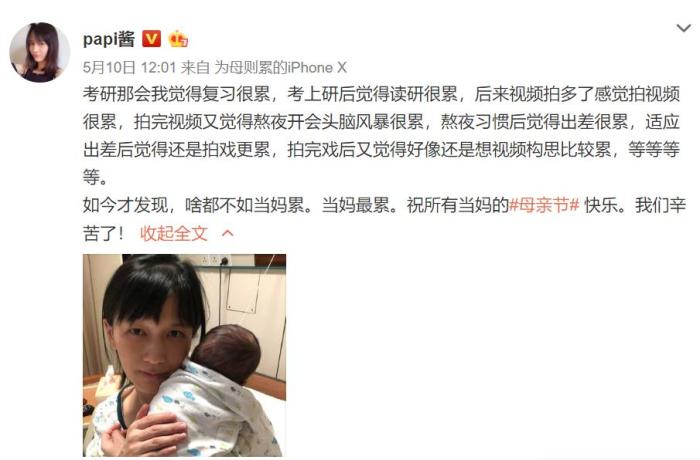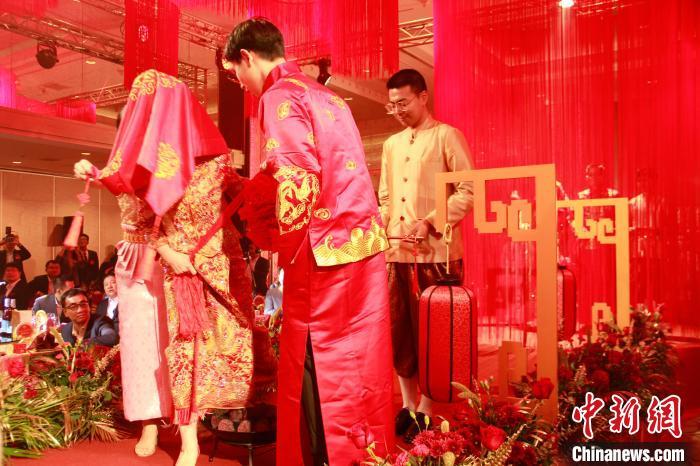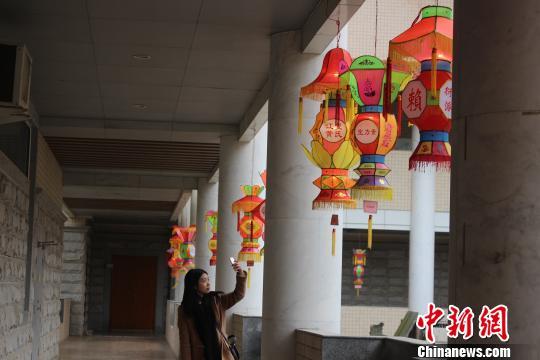Beijing, May 13 (Yuan Xiuyue), the client of Zhongxin. com, in the past two days, the word "the right of crown surname" has entered the public eye again. Papi sauce was scolded by netizens because it was revealed in the latest video that her child took his father’s surname.
Some netizens think that papi sauce doesn’t even pay attention to the right of "crown name", and her independent female persona is fake.

Weibo screenshot
Last month, a female blogger wrote that she chose to divorce her husband because she failed to fight for her children’s "right to the crown", which triggered a large-scale discussion on the Internet.

Weibo screenshot
What is "the right of crown and surname"? Why can it lead to heated discussions again and again? Today we start with the history of surnames.
What does the surname stand for?
In fact, at the earliest time, "surname" and "surname" were two different things. "Surname" is the product of matriarchal clan society. In order to stop incest, disorderly marriage and other phenomena, the clan implements the system of marriage outside the clan, and the children live with their mothers. Surname is a symbol shared by descendants of the same female ancestor.
Because women were the first to be the standard, the oldest surnames in China all have female characters beside them. Such as: Ji, Jiang, Yi, Yao, Yi, Yi, Pregnancy, Yi, Yi, Gu, etc.
And "surname" is a branch derived from "surname". The earliest surname is the honor of women, and men have neither surname nor surname. Later, men had surnames, but the surnames were expensive and the surnames were cheap.
In the patriarchal clan period, the status of surnames was reversed. The son of heaven has a surname but no surname, princes and doctors have a surname, and civilians and slaves only have a surname, but no surname has no surname. It was not until the Zhou Dynasty that surnames and surnames began to be confused. In the Qin and Han dynasties, surnames were combined into one, and civilians gradually got surnames.
Some scholars say that surnames came into being in the later period of primitive society and took shape in slave society, but it really became a social ideology in feudal society.
The origin of women’s husband’s surname
Surnames were distinguished from noble ones when they came into being. In feudal society, after surnames were fixed as a system, they also formed a complete set of etiquette norms at the level of noble, low and high. For example, in the Western Han Dynasty, the gate system flourished, and surnames evolved into one of the tools to safeguard property and power.
The ancient concept that men are superior to women is also reflected in surnames. After entering the patriarchal society, women gradually lost their surnames. Before marriage, a woman shares her father’s surname, and after marriage, she belongs to her husband’s surname, which can be called her husband’s surname or her father’s surname. In public, most women don’t use their first names, especially after marriage, most outsiders call them "a certain lady" with their husband’s surname, or "a certain surname" with their father’s surname, or "a certain surname" with their husband’s surname.
This surname system lasted for thousands of years, and it was not loosened until modern times. During the period of the Republic of China, the change of married women’s surnames in the Civil Law of the Republic of China has aroused heated discussions from all walks of life.

Data map. The picture and text are irrelevant. Photo by Wang Guoan
Some people hope to maintain the old custom system, and think that the real equality between men and women does not lie in the mere surname. It has been suggested that married women take their husbands’ surnames and adopted men take their wives’ surnames, but they have to use their own names when they are abroad.
Some people also support women to keep their surnames after marriage, or to treat them differently, such as independent women keeping surnames. Others put forward radical opinions that surnames are unnecessary, and there is no dispute between men and women.
Based on the social and historical conditions at that time, the "Civil Law of the Republic of China" still continued the custom, and its Article 1000th stipulated: "A wife takes her own surname as her husband’s surname; A widower takes his own surname as his wife’s surname, unless otherwise stipulated by the parties. " That is to say, under agreed circumstances, women don’t have to take their husbands’ surnames.

Data Map: The First Quanzhou Surname Culture Lantern Exhibition. Photo by Liao Jing
The Marriage Law stipulates that children can take their mother’s surname.
With the idea of equality between men and women deeply rooted in people’s hearts, the "husband’s surname" has gradually disappeared in life. Article 11 of China’s Marriage Law in 1950 stipulated that "husband and wife have the right to use their own names."
As for the child’s surname, the Marriage Law of 1980 stipulates that "children can take their father’s surname or their mother’s surname." China’s current Marriage Law is changed to "Children can take their father’s surname or their mother’s surname." The word difference reflects the respect for gender equality and women’s social status.
According to a report released by the Ministry of Public Security, the number of people who use both their father’s surname and mother’s surname in their names has increased rapidly in the last 30 years. At the end of 1990, this figure was 118,000. By the end of 2018, this figure had increased to 1.1 million.
However, in real life, children still occupy the mainstream with their father’s surname. In recent years, with the rise of women’s consciousness, there are more and more discussions about children’s "right to crown their surnames", and some even ruin their families because of "the difference of one surname". Since 2015, with the liberalization of the second child policy, the number of second children with their mother’s surname has also increased significantly.

Data map: The picture and text are not related. Photo by Wu Junjie
Is it necessary to fight for the right of "crown surname"?
Today, "crown your surname in my name" seems to be no longer a romantic language, and the family inheritance and blood map carried by surnames are no longer as heavy as before. As some people have said, women’s pursuit of "the right to crown their surnames" seems to be a dispute of "two surnames", but in fact it is a dispute of "two sexes", which is the expression of women’s maintenance of their own rights and interests and their autonomy.
However, there seems to be no necessary connection between the struggle for "crown name right" and independent women. Not all women who fight for "crown name right" are independent women, or those who don’t fight for it are not independent women. Whether she is an independent woman or not depends on whether she has an independent personality, an independent economy, and her unique pursuit of life and contribution to society, not by verbal talk.
Those who abuse their children because others choose a different way of life, or because their children take their father’s surname, may not pursue "the right to be crowned" but "hegemony".
Moreover, unlike fighting for one’s own name right, fighting for the "crown name right" of children also involves husbands, and children may also have to express their opinions when they grow up. To tell the truth, this is an agreement within the family, which is none of others’ business, right (End)